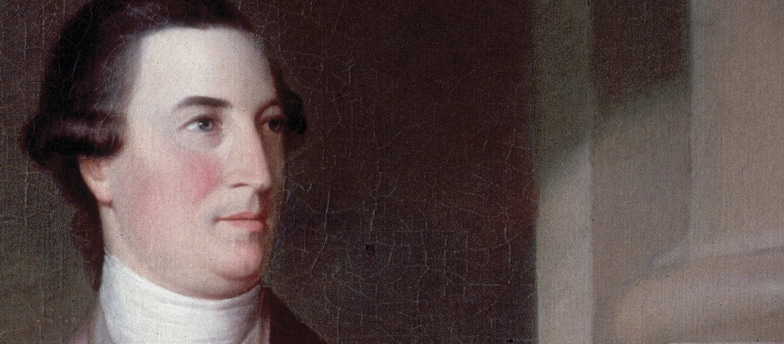William Paca (October 31, 1740 – October 23, 1799) was a lawyer, judge, Governor, and American Revolutionary War patriot.

He served as a delegate from Maryland to the Second Continental Congress and became an infamous signer of the Declaration of Independence.
While he showed flashes of brilliance while practicing law in Annapolis, his name gained notoriety during the Stamp Act.
Jump to:
He was elected to the Maryland legislature in 1771 and was then selected to serve in the First Continental Congress in 1774.
He, along with three other Maryland delegates, would sign the Declaration of Independence and brand themselves as traitors.
His fellow delegates were Charles Carroll of Carrollton, Thomas Stone, and Samuel Chase.
The Life of William Paca
William Paca was born in the Maryland colony and was the son of John Paca, who was a wealthy planter. John was convinced that a good education was important for his son and sent him to the best schools in the colony.
William showed much promise throughout his education and graduated with a bachelor of arts degree. Three years later, William earned a Master's degree.
Upon returning home, he began studying law under Stephen Bradley and here would realize his vocation. After studying under Bradley, William earned his license in 1761 and was admitted to the bar in 1764.
He would go on to establish his practice in Annapolis.
While in Annapolis, Paca came into contact with Samuel Chase. The two began a fruitful friendship that served each of them well through the revolutionary years.
Both became leading voices against the British actions in the Stamp Act and organized a local chapter of the Sons of Liberty. He would be elected to the House of Burgesses in 1771 and then sent to serve as a delegate to the Continental Congress. Here, he and his fellow Maryland delegates signed in support of the Declaration of Independence.
During the American Revolutionary War, Paca remained active in politics and would become the chief justice of Maryland in 1782.
Seven years later, he would be elected as Governor of the state of Maryland. George Washington appointed him as a Chief Justice of the United States District Court for the District of Maryland.
He would serve in this post until his death in 1799.
During his term as governor, he championed education in religion and literature and said this to the General Assembly of Maryland:
It is far from our intention to embarrass your deliberations with a variety of objects, but we cannot pass over matters of so high concernment as religion and learning. The sufferings of the ministers of the gospel of all denominations during the war have been very considerable, and the perseverance and firmness of those who discharged their sacred functions under many discouraging circumstances claim our acknowledgments and thanks. The bill of Rights and form of government recognize the principle of public support for the ministers of the gospel and ascertain the mode. Anxiously solicitous for the blessings of government and the welfare and happiness of our citizens and thoroughly convinced of the powerful influence of religion, when diffused by its respectable teachers, we beg leave most seriously and warmly to recommend, among the first objects of your attention on the return of peace, the making such provision as the constitution, in this case, authorizes and approves.
William Paca served as Chief Justice of the United States District Court for the District Court of Maryland and, by all accounts, served there admirably and with high integrity.
William Paca died on October 23, 1799, at the age of fifty-eight. He was mourned by all in Maryland.

